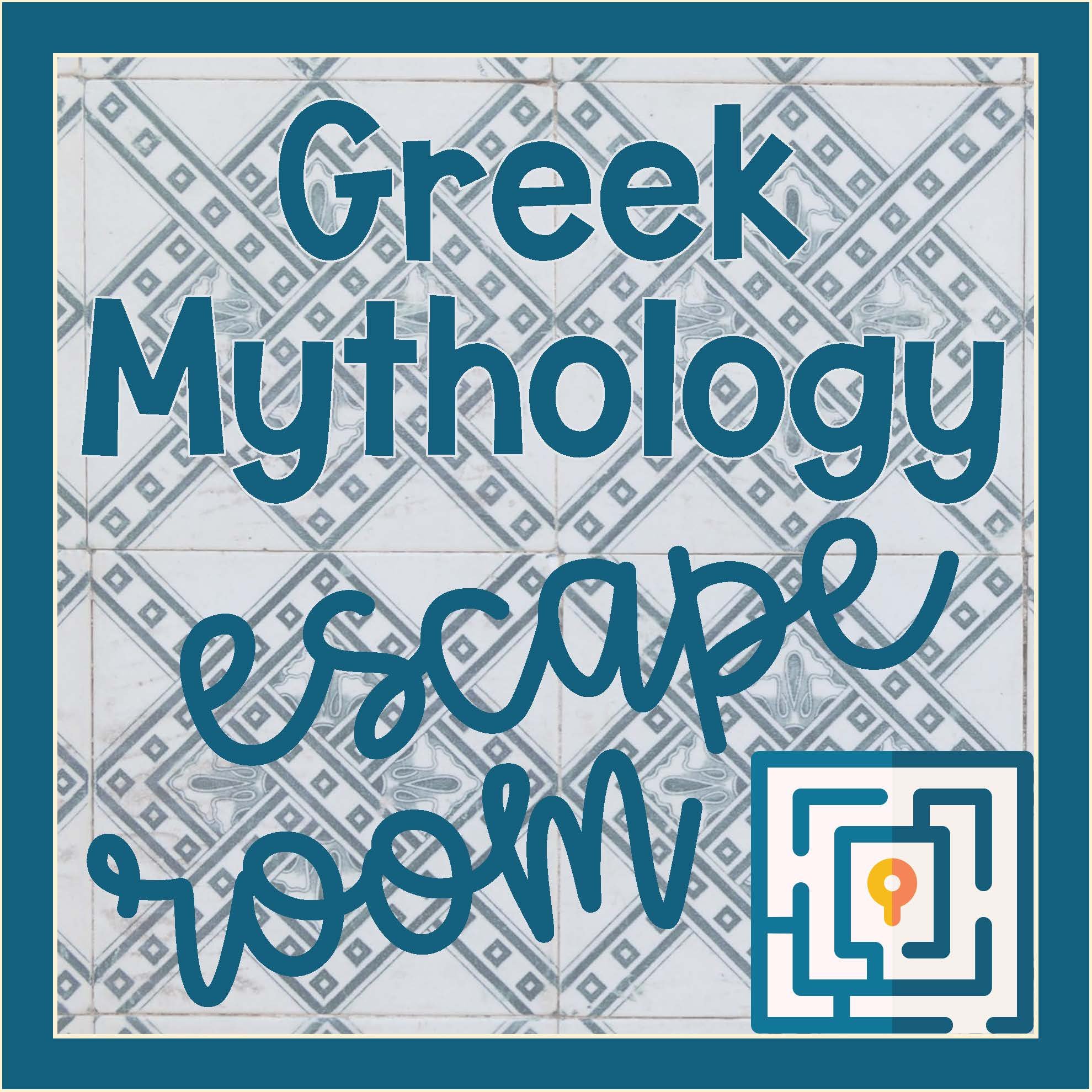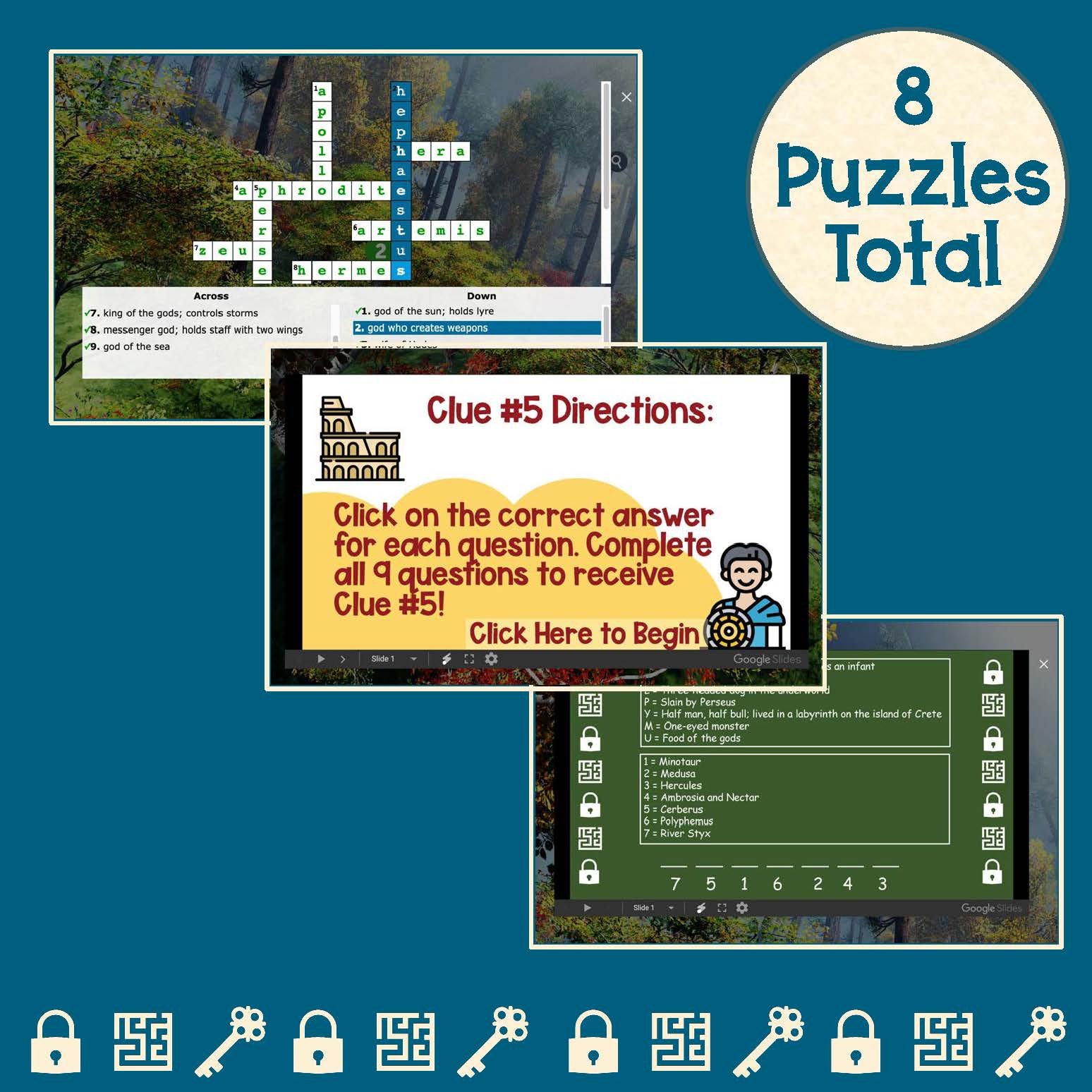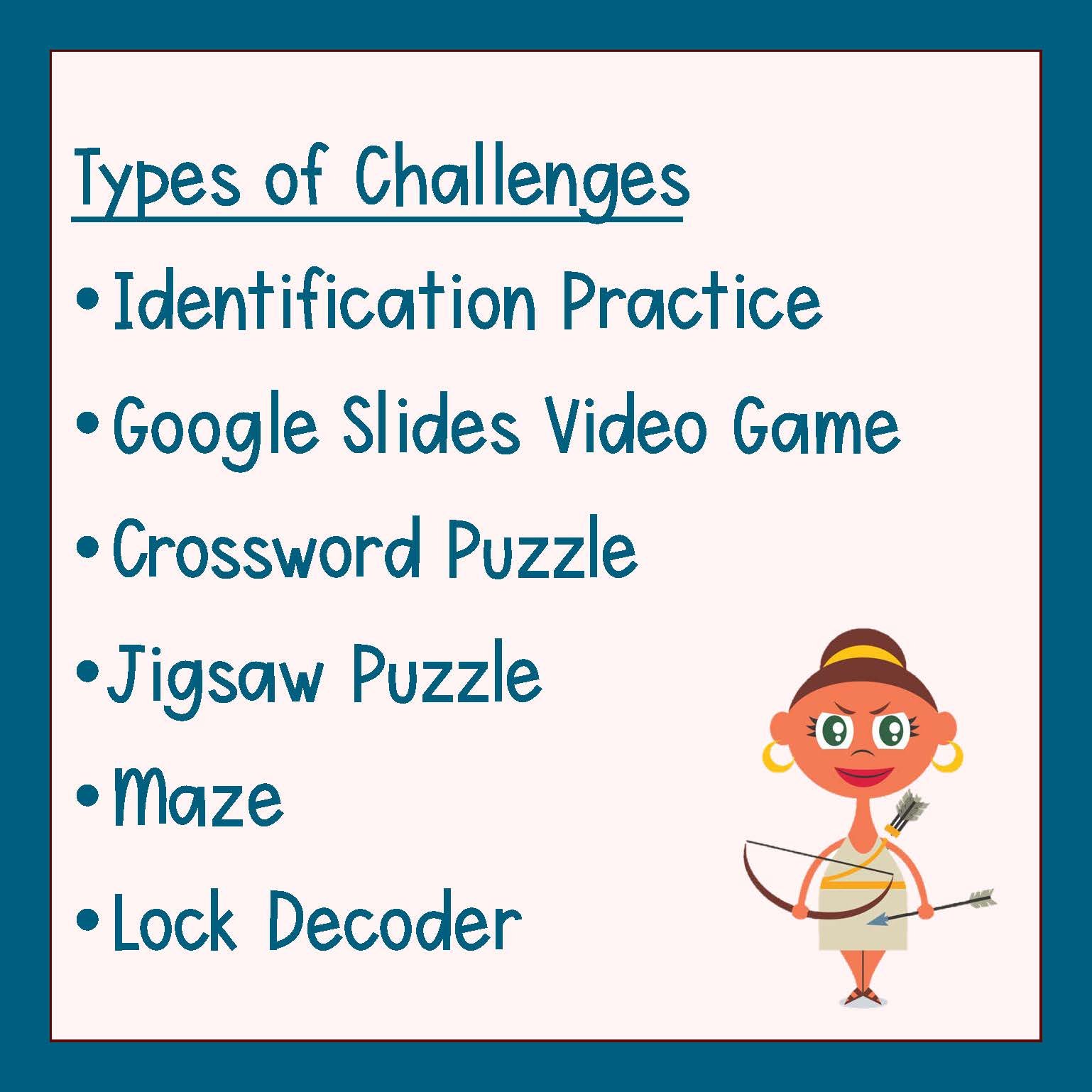Greek Mythology Lesson
Greek mythology is a captivating subject that can spark the imagination of middle school students. With these engaging lesson plans, you can bring the world of gods, heroes, and monsters to life in your classroom. Dive into the rich stories and characters of Greek mythology and watch as your students become enthralled by this ancient world. My favorite Greek Mythology activity is this digital escape room!
Greek Mythology Lesson Plan
Objective: Students will delve into the fascinating realm of Greek mythology, understanding its significance, characters, and stories. By the end of the lesson, students will be able to identify major gods and goddesses, analyze famous myths, and relate the ancient tales to modern culture.
Greek Mythology Lesson Duration: 4-5 sessions (45 minutes each)
Materials:
Printed or digital resources on Greek mythology (books, articles, websites)
Whiteboard or chalkboard
Markers or chalk
Art supplies (paper, pencils, coloring materials)
Projector and screen (optional for multimedia presentations)
Lesson Plan:
Session 1: Introduction to Greek Mythology
Objective: Introduce students to the concept of Greek mythology and its importance in ancient Greek culture.
Warm-up Activity (10 minutes):
Display images of famous Greek gods and goddesses on the board.
Ask students to write down the names of the deities they recognize.
Discuss as a class and explain that these are characters from Greek mythology.
Introduction to Greek Mythology (15 minutes):
Present an overview of Greek mythology, explaining its origins and purpose in ancient Greek society.
Discuss how myths were used to explain natural phenomena, human behavior, and the origins of the world.
Major Gods and Goddesses (20 minutes):
Introduce the most important gods and goddesses in Greek mythology (Zeus, Hera, Poseidon, Athena, etc.).
Provide brief descriptions of their attributes, symbols, and domains of influence.
Session 2: Famous Myths and Heroes
Objective: Explore popular Greek myths and heroic tales, understanding their themes and messages.
Recap of Major Deities (10 minutes):
Begin with a quick review of the major gods and goddesses discussed in the previous session.
Myth Analysis (30 minutes):
Divide students into small groups and assign each group a famous Greek myth (e.g., "Perseus and Medusa," "Pandora's Box," "Theseus and the Minotaur").
In their groups, students should read and analyze the myth, identifying the main characters, plot, and underlying message.
Each group presents their myth analysis to the class.
Session 3: Connecting Myths to Modern Culture
Objective: Recognize the influence of Greek mythology in contemporary literature, movies, and everyday language.
Review of Myths (10 minutes):
Briefly review the myths discussed in the previous session.
Modern Interpretations (20 minutes):
Provide examples of how Greek myths have been adapted and incorporated into modern culture (e.g., "Percy Jackson" book series, "Clash of the Titans" movie).
Discuss how references to Greek mythology are commonly used in idioms and expressions.
Creative Project (15 minutes):
In pairs or individually, students create their own modern interpretation of a Greek myth, such as a comic strip, short story, or poem, that showcases its relevance in today's world.
Session 4: Culminating Activity and Assessment
Objective: Evaluate students' understanding of Greek mythology through a culminating project.
Presentation Preparation (20 minutes):
Allow students time to finalize their creative projects from the previous session.
Presentations (20 minutes):
Each student or pair presents their modern interpretation to the class.
Encourage discussions and feedback from the audience.
Mythology Quiz (10 minutes):
Administer a short quiz to assess students' knowledge of major gods, goddesses, and key myths.
Closure (5 minutes):
Summarize the main points of the lesson and emphasize the enduring influence of Greek mythology in modern culture.
Optional Extension Activity: Organize a Greek mythology-themed day with costumes, storytelling, and interactive games based on the myths discussed in class.
Assessment:
Participation in class discussions and activities
Myth analysis presentation
Modern interpretation project
Mythology quiz results
Digital Escape Room for Greek Mythology Lesson
The perfect activity within a Greek Mythology lesson is a digital escape room! Escape rooms foster student-led learning and teamwork!
The Benefits of Using a Digital Escape Room to Teach Greek Mythology
Are you looking for a fun and engaging way to teach Greek mythology to your students? Look no further than a digital escape room! By incorporating this interactive and immersive learning experience, you can captivate your students' attention and make the subject come alive. In this article, we will explore the exciting benefits of using a digital escape room to teach Greek mythology. Get ready to take your students on an educational adventure they won't forget!
Interactive and Engaging Learning: A digital escape room allows students to actively participate in their learning experience, making it more engaging and memorable.
Traditional methods of teaching Greek mythology often involve reading textbooks or listening to lectures, which can be passive and less engaging for students. However, with a digital escape room, students become active participants in their learning. They are challenged to solve puzzles, find clues, and unravel the mysteries of Greek mythology. This hands-on approach not only makes the learning experience more enjoyable, but it also helps students retain information better. By actively engaging with the content, students are more likely to remember the stories, characters, and themes of Greek mythology. Plus, the element of competition and teamwork in a digital escape room adds an extra layer of excitement and motivation for students to learn and succeed.
Immersive Storytelling: By incorporating Greek mythology into the escape room narrative, students are transported into the world of gods, heroes, and mythical creatures, enhancing their understanding and appreciation of the subject.
The use of immersive storytelling in a digital escape room allows students to fully immerse themselves in the world of Greek mythology. By incorporating elements of the myths and legends into the narrative of the escape room, students are transported into a world filled with gods, heroes, and mythical creatures. This not only enhances their understanding of the subject matter, but it also helps them develop a deeper appreciation for the stories and themes of Greek mythology. As they work their way through the escape room, students will encounter challenges and puzzles that are directly related to the myths they are learning about. This hands-on approach to learning not only makes the experience more enjoyable, but it also helps students retain information better. By actively engaging with the content and experiencing the stories firsthand, students are more likely to remember the details and intricacies of Greek mythology.
Critical Thinking and Problem-Solving Skills: Digital escape rooms require students to think critically, solve puzzles, and work collaboratively, fostering important skills that can be applied in various academic and real-life situations.
One of the key benefits of using a digital escape room to teach Greek mythology is the development of critical thinking and problem-solving skills. In order to successfully navigate through the escape room and solve the puzzles, students must think critically, analyze information, and make logical connections. They are required to use their knowledge of Greek mythology to decipher clues and solve challenges, which encourages them to think creatively and outside the box.
Additionally, digital escape rooms often require students to work collaboratively in teams. This fosters important teamwork and communication skills, as students must effectively communicate and cooperate with their peers to solve the puzzles and escape the room. They learn how to listen to others' ideas, share their own thoughts, and work together towards a common goal.
These critical thinking and problem-solving skills are not only valuable in the context of Greek mythology, but they can also be applied in various academic and real-life situations. Students learn how to approach complex problems, break them down into smaller, manageable tasks, and find innovative solutions. These skills are transferable to other subjects and disciplines, as well as future careers and everyday life.
Overall, incorporating a digital escape room into the teaching of Greek mythology provides a unique and engaging learning experience that not only enhances students' understanding of the subject matter but also helps them develop important critical thinking and problem-solving skills that will benefit them in the long run.
Differentiated Learning: With students working as a team, a digital escape room can cater to different learning styles and abilities, ensuring that all students can participate and succeed.
One of the key benefits of using a digital escape room to teach Greek mythology is its ability to cater to different learning styles and abilities through customizable difficulty levels and various challenges. In a traditional classroom setting, it can be challenging to meet the needs of all students, as they may have different levels of understanding and engagement. However, with a digital escape room, teachers can adjust the difficulty level of the puzzles and challenges to accommodate different learning styles and abilities.
For example, students who are more advanced or have a deeper understanding of Greek mythology can be given more complex puzzles and challenges to solve, while students who may struggle with the subject can be provided with simpler tasks that still require them to engage with the material. This allows all students to participate and succeed in the escape room activity, regardless of their prior knowledge or skill level.
Furthermore, the interactive and immersive nature of a digital escape room appeals to different learning styles. Some students may be visual learners who benefit from seeing and interacting with the content, while others may be auditory learners who prefer listening to explanations and discussions. By incorporating a variety of multimedia elements, such as videos, images, and audio recordings, a digital escape room can accommodate different learning preferences and ensure that all students are actively engaged in the learning process.
Overall, the ability to customize difficulty levels and provide various challenges in a digital escape room allows for differentiated learning, ensuring that all students can participate and succeed in the activity. This not only enhances their understanding of Greek mythology but also promotes inclusivity and supports their individual learning needs.
Immediate Feedback and Assessment: As students progress through the escape room, they receive instant feedback on their performance, allowing teachers to assess their understanding and address any misconceptions in real-time.
One of the major benefits of using a digital escape room to teach Greek mythology is the immediate feedback and assessment it provides. As students progress through the escape room, they receive instant feedback on their performance, allowing teachers to assess their understanding and address any misconceptions in real-time.
Traditional assessment methods, such as quizzes or tests, often require time-consuming grading and may not provide immediate feedback to students. This can result in a delay in identifying and addressing any misunderstandings or gaps in knowledge. However, with a digital escape room, students receive immediate feedback on their actions and decisions within the game.
For example, if a student selects the wrong answer or fails to solve a puzzle, they will be notified immediately and can try again or receive hints to guide them in the right direction. This instant feedback allows students to learn from their mistakes and make corrections in real-time, promoting a deeper understanding of the subject matter.
Additionally, the immediate feedback provided by a digital escape room allows teachers to monitor student progress and identify areas where additional support or instruction may be needed. By observing how students navigate through the escape room and analyzing their responses, teachers can gain valuable insights into their understanding of Greek mythology and tailor their instruction accordingly.
Overall, the immediate feedback and assessment provided by a digital escape room enhance the learning experience for students and support their academic growth. It allows for timely intervention and ensures that students receive the necessary guidance and support to succeed in their learning journey.







